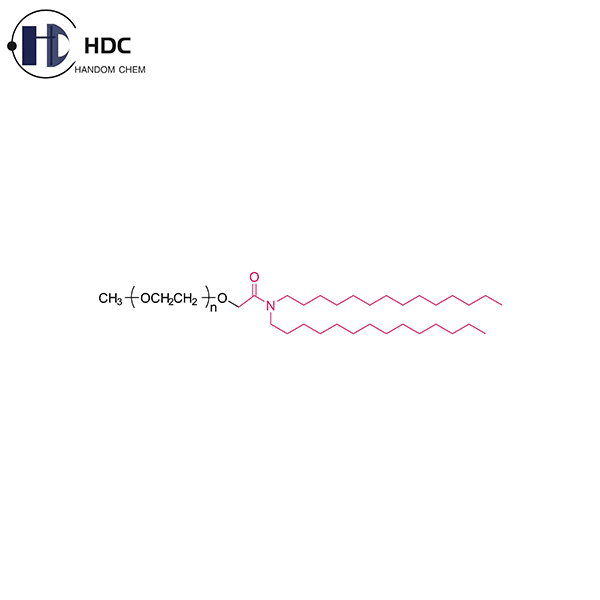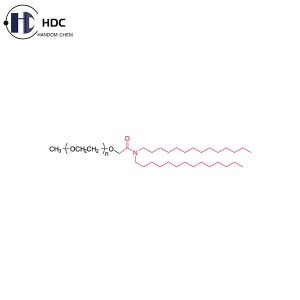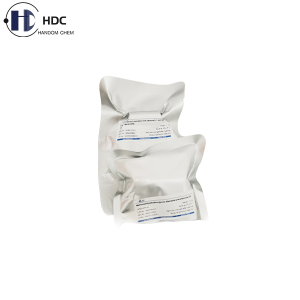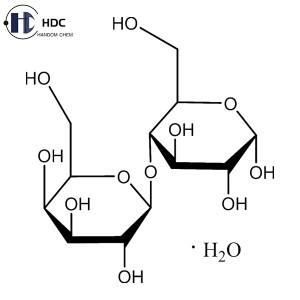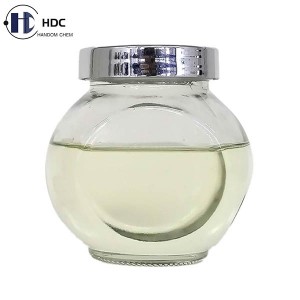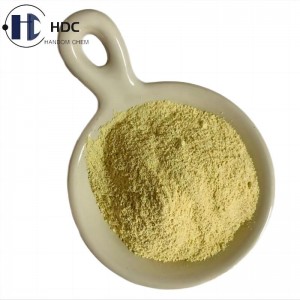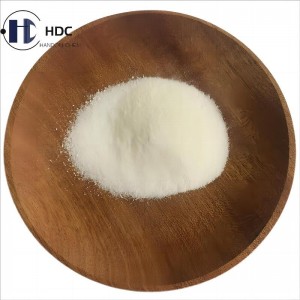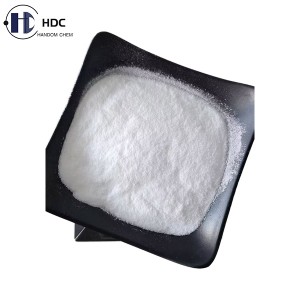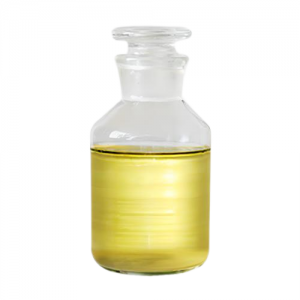Methoxypoly(ethylene glycol) ditetradecylacetamide
Brief Introduction:
Methoxypoly(ethylene glycol) ditetradecylacetamide is a pegylated lipid, the CAS number is: 1849616-42-7, which has a unique chemical structure and biological activity. Its structure includes a hydrophilic part and a hydrophobic part, and this dual nature enables it to play a special role in the body.
The introduction of methoxy polyethylene glycol not only increases its solubility in water, but also gives it higher biocompatibility and stability.
The presence of ditetradecyl acetamide gives it good lipophilicity, allowing it to better interact with cell membranes.
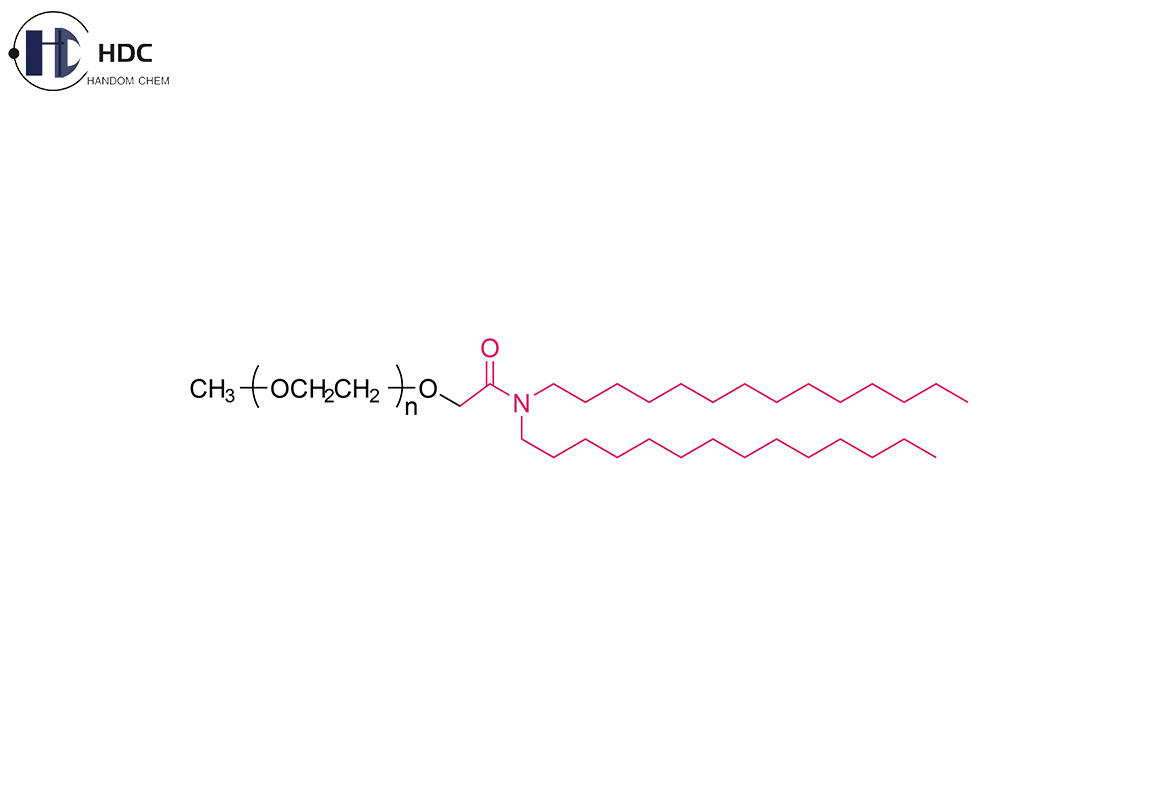
Solubility:
Methoxypoly(ethylene glycol) ditetradecylacetamide has good solubility and is soluble in water and many organic solvents.
Specifications of our Methoxypoly(ethylene glycol) ditetradecylacetamide:
| Test Items | Specifications | Test Methods | |
| Appearance | White powder-like solid | Visual | |
| Identity | IR | Complies with the reference substance structure | IR |
| H-NMR | Complies with the reference substance structure | H-NMR | |
| Assay | 90.0% ~ 110.0% | HPLC | |
| Purity | Not less than 95.0% | HPLC | |
| Average Molecular Weight | 2400±240 Da | MALDI-TOF | |
| Polydispersity(Mw/Mn) | Not more than 1.05 | GPC | |
| Related Substances | mPEG-CM-2K | Not more than 1.00% | HPLC |
| mPEG-OH-2K | Not more than 1.00% | HPLC | |
| DTA | Not more than 0.20% | HPLC | |
| DTA-PEG-DTA-4K | Not more than 1.00% | HPLC | |
| DTA-PEG-DTA-2K | Not more than 1.00% | HPLC | |
| mPEG-TA-2K | Not more than 1.00% | HPLC | |
| mPEG-TTA-2K(-14) | Not more than 1.00% | HPLC | |
| mPEG-DTA-2K(-28) | Not more than 1.00% | HPLC | |
| mPEG-TPA-2K(+14) | Not more than 1.00% | HPLC | |
| mPEG-THA-2K(+28) | Not more than 1.00% | HPLC | |
| mPEG-THA-2K(+42) | Not more than 1.00% | HPLC | |
| mPEG-TOA-2K(+56) | Not more than 1.00% | HPLC | |
| EDU | Not more than 1000 ppm | HPLC | |
| HOBt | Not more than 1000 ppm | HPLC | |
| Residual Solvents | Dichloromethane | Not more than 600 ppm | GC |
| Isopropanol | Not more than 5000 ppm | GC | |
| n-Hexane | Not more than 290 ppm | GC | |
| Methyl tert-butyl ether | Not more than 5000 ppm | GC | |
| Methanol | Not more than 3000 ppm | GC | |
| Ethanol | Not more than 5000 ppm | GC | |
| Toluene | Not more than 890 ppm | GC | |
| Tetrahydrofuran | Not more than 720 ppm | GC | |
| n-Heptane | Not more than 5000 ppm | GC | |
| Moisture | Not more than 1.00% | KF | |
| Microbial Limits | Total Aerobic Microbial Count | Not more than 100 CFU/g | ChP<1105> |
| Total combined Yeasts & Mould Count | Not more than 10 CFU/g | ChP<1105> | |
| Bacterial Endotoxin | Not more than 0.015 EU/mg | ChP<1143> | |
| Elemental Impurities | Cuprum (Cu) | Not more than 30 ppm | ICP-MS |
| Arsenic (As) | Not more than 1.5 ppm | ICP-MS | |
| Cadmium (Cd) | Not more than 0.2 ppm | ICP-MS | |
| Mercury (Hg) | Not more than 0.3 ppm | ICP-MS | |
| Lead (Pb) | Not more than 0.5 ppm | ICP-MS | |
| Cobalt (Co) | Not more than 0.5 ppm | ICP-MS | |
| Vanadium (V) | Not more than 1.0 ppm | ICP-MS | |
| Nickel (Ni) | Not more than 2.0 ppm | ICP-MS | |
| Lithium (Li) | Not more than 25 ppm | ICP-MS | |
| Antimony (Sb) | Not more than 9 ppm | ICP-MS | |
Features & Applications of mPEG-DTA-2K(ALC-0159)
In the field of scientific research, Methoxypoly(ethylene glycol) ditetradecylacetamide has received widespread attention due to its unique properties. It has been widely used in drug delivery, cancer research, and biochemistry. As a lipophilic compound, it can effectively encapsulate drugs or other bioactive substances inside to form stable nanoparticles. These nanoparticles can enter the cell through the permeation of the cell membrane to achieve efficient drug delivery.
In addition, Methoxypoly(ethylene glycol) ditetradecylacetamide also has high uptake rate and targeting. It can interact with the cell membrane to promote the cell's uptake of drugs or genetic materials, thereby improving the efficiency of treatment. At the same time, by selecting appropriate targeting ligands, such as antibodies or specific receptor ligands, Methoxypoly(ethylene glycol) ditetradecylacetamide can guide the directional delivery of drugs or genetic materials to target cells or tissues to achieve precise treatment.
It is worth mentioning that Methoxypoly(ethylene glycol) ditetradecylacetamide also shows the advantages of low toxicity and adverse reactions. Compared with the direct use of drugs or genetic materials, the use of methoxypoly(ethylene glycol) ditetradecylacetamide as a delivery system can reduce toxicity and adverse reactions because liposomes can control the release and duration of drugs and reduce damage to normal cells.
Packaging:
1g/Bottle, 3g/Bottle, 5g/Bottle, 10g/Bottle, 100g/Bag or according to the specific requirements from customers.
Recommended Storage Conditions:
For short-term storage, it is recommended to store at 2℃ ~ 8℃; it is recommended to keep at -25℃ ~ -15℃ under an inert atmosphere for long-term storage.
For reducing the absorption of the moisture, it should be slowly warmed to ambient temperature before opened.
Note:
Use in a dry environment and avoid frequent dissolution and freeze-drying.
Shelf Life:
36 months if stored under above conditions.


